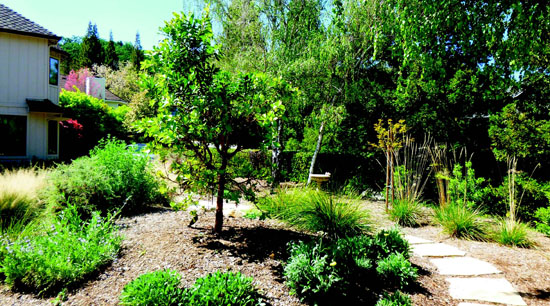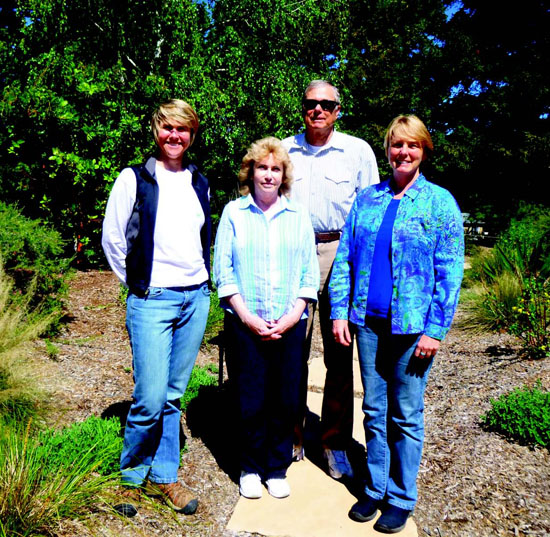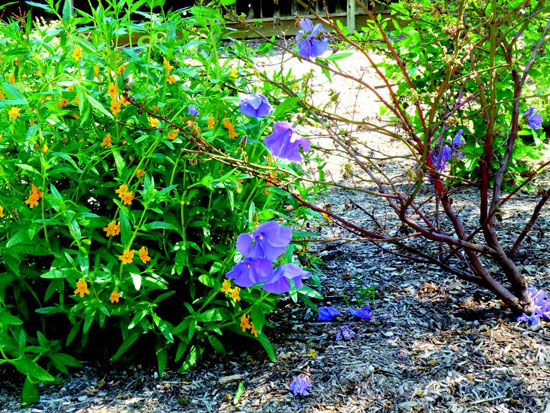 | | | A flagstone path meanders through this native backyard oasis. Photo provided | | | | | | Adding your house to the list of East Bay homes featured in the May 3 Bringing Back the Natives Garden Tour says a lot about pride of a job well done. Lafayette residents Sandy and Richard Brehmer transformed their garden into a native beauty one and a half years ago. In the beautiful 7,000 square foot space, they enjoy the outdoors more now than they ever have before.
 When the Brehmers decided to replace their lawn, they took a hard look at the large flat surface and thought it was time to create something a little more interesting.
When the Brehmers decided to replace their lawn, they took a hard look at the large flat surface and thought it was time to create something a little more interesting.
 "For years we had been concerned about our water bill," remembers Richard Brehmer. "At one point it reached $600 and our very large lawn was not even as beautiful as Sandy would have liked it to be."
"For years we had been concerned about our water bill," remembers Richard Brehmer. "At one point it reached $600 and our very large lawn was not even as beautiful as Sandy would have liked it to be."
 A neighbor had already "gone native."
A neighbor had already "gone native."
 "We liked what she had done a lot, and we asked her the name of her landscape architect," says Sandy Brehmer.
"We liked what she had done a lot, and we asked her the name of her landscape architect," says Sandy Brehmer.
 Roxy Wolosenko, owner of Roxy Designs, came over and started imagining how to transform the Brehmer's level space into something more remarkable. Wolosenko focuses on drought-resistant landscaping "because it just makes sense to plant what is naturally thriving in an area," she says. "I create gardens that are about 80 percent native, adding plants that are drought tolerant, but from other regions. Not everything flowers at the same time and it makes for a more interesting display."
Roxy Wolosenko, owner of Roxy Designs, came over and started imagining how to transform the Brehmer's level space into something more remarkable. Wolosenko focuses on drought-resistant landscaping "because it just makes sense to plant what is naturally thriving in an area," she says. "I create gardens that are about 80 percent native, adding plants that are drought tolerant, but from other regions. Not everything flowers at the same time and it makes for a more interesting display."
 Although they had several discussions about concepts and plants, the Brehmers gave carte blanche to Wolosenko.
Although they had several discussions about concepts and plants, the Brehmers gave carte blanche to Wolosenko.
 First, she created a new backbone for the garden. Wolosenko constructed berms and flagstone alleyways meandering between them. Each berm is different from the others and offers a different visual presentation. Large grasses sit next to flowers or cacti-like plants. Large purple bushes planted alongside colorful ground cover. Wolosenko and the Brehmers chose rocks to place among the plants, creating a more natural look.
First, she created a new backbone for the garden. Wolosenko constructed berms and flagstone alleyways meandering between them. Each berm is different from the others and offers a different visual presentation. Large grasses sit next to flowers or cacti-like plants. Large purple bushes planted alongside colorful ground cover. Wolosenko and the Brehmers chose rocks to place among the plants, creating a more natural look.
 Their garden invites discovery. When the Brehmers' grandchildren come to visit, they love to explore the pathways. A few quiet areas of the garden are perfect for reading. There, when Richard Brehmer isn't enjoying a book, he is observing the wildlife that now populates his garden. "I watch the bees on their daily forage for nectar, and the hummingbirds that now come all the time," he says with a peaceful smile.
Their garden invites discovery. When the Brehmers' grandchildren come to visit, they love to explore the pathways. A few quiet areas of the garden are perfect for reading. There, when Richard Brehmer isn't enjoying a book, he is observing the wildlife that now populates his garden. "I watch the bees on their daily forage for nectar, and the hummingbirds that now come all the time," he says with a peaceful smile.
 Wolosenko says she loves the moment plants arrive in their pots on a site. "Immediately the insects start showing up, and the magic begins," she says.
Wolosenko says she loves the moment plants arrive in their pots on a site. "Immediately the insects start showing up, and the magic begins," she says.
 Sandy Brehmer also enjoys her new garden, especially on their new flagstone terrace shaded by a trellis.
Sandy Brehmer also enjoys her new garden, especially on their new flagstone terrace shaded by a trellis.
 Although changing their backyard so dramatically was more expensive than replacing their lawn, they did it "because it felt like the right thing to do," says Richard Brehmer, referring to the drought.
Although changing their backyard so dramatically was more expensive than replacing their lawn, they did it "because it felt like the right thing to do," says Richard Brehmer, referring to the drought.
 During these dry times, the East Bay Municipal Utility District is offering incentives to help people reduce their water use in the garden. The Water Smart program includes a rebate of up to $2,500 for single-family homeowners. There is up to $20,000 for commercial and multi-family units to convert lawns to sustainable landscaping or to install other water saving measures. "Outside water use represents 60 percent of a single family's water use, and lawns require a lot of water to stay green," says EBMUD Public Information Representative Nelsy Rodriguez. She believes that this summer is the perfect time to let lawns dry up and to replace it in the fall with drought resistant plants.
During these dry times, the East Bay Municipal Utility District is offering incentives to help people reduce their water use in the garden. The Water Smart program includes a rebate of up to $2,500 for single-family homeowners. There is up to $20,000 for commercial and multi-family units to convert lawns to sustainable landscaping or to install other water saving measures. "Outside water use represents 60 percent of a single family's water use, and lawns require a lot of water to stay green," says EBMUD Public Information Representative Nelsy Rodriguez. She believes that this summer is the perfect time to let lawns dry up and to replace it in the fall with drought resistant plants.
 Gov. Jerry Brown signed an executive order April 1 requiring cities and water districts to cut water use by 25 percent compared to 2013 levels or face fines of up to $10,000 a day this summer. "EBMUD's board of directors will meet in June to approve the budget for the next two years," says Rodriguez. "Besides raising the rates, they may consider penalties for those residents whose water use is significantly above average." Rodriguez adds that there is already a state restriction in place that limits lawn watering to only twice a week, before 6 a.m. or after 10 p.m. In EBMUD's service area, a typical family of three uses about 280 gallons daily indoors and out.
Gov. Jerry Brown signed an executive order April 1 requiring cities and water districts to cut water use by 25 percent compared to 2013 levels or face fines of up to $10,000 a day this summer. "EBMUD's board of directors will meet in June to approve the budget for the next two years," says Rodriguez. "Besides raising the rates, they may consider penalties for those residents whose water use is significantly above average." Rodriguez adds that there is already a state restriction in place that limits lawn watering to only twice a week, before 6 a.m. or after 10 p.m. In EBMUD's service area, a typical family of three uses about 280 gallons daily indoors and out.
 The process to get rebates is simple, she explains: Go to the agency's website at EBMUD.com and register before beginning any changes to your garden. EBMUD representatives will visit the residence. Then after the improvements have been made and documented, homeowners get the rebate.
The process to get rebates is simple, she explains: Go to the agency's website at EBMUD.com and register before beginning any changes to your garden. EBMUD representatives will visit the residence. Then after the improvements have been made and documented, homeowners get the rebate.
 The free May 3 Bringing Back the Natives Tour features several workshops. It is a great opportunity to see different drought-resistant native gardens, to get inspired and to learn. Besides the Brehmers' home, two gardens in Moraga and three in Orinda are among the 30 East Bay homes featured on the tour.
The free May 3 Bringing Back the Natives Tour features several workshops. It is a great opportunity to see different drought-resistant native gardens, to get inspired and to learn. Besides the Brehmers' home, two gardens in Moraga and three in Orinda are among the 30 East Bay homes featured on the tour.
 To receive the catalog that includes addresses of the homes, registration is required and it ends April 25. To register, visit
To receive the catalog that includes addresses of the homes, registration is required and it ends April 25. To register, visit
 http://www.bringingbackthenatives.net/.
http://www.bringingbackthenatives.net/.

|


